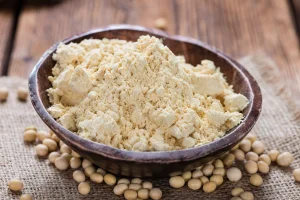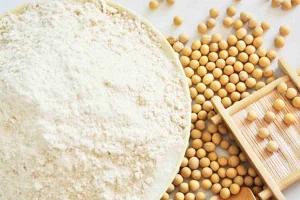What is Isolated Soy Protein?
Isolated soy protein (ISP) is a highly refined form of soy protein derived from defatted soy flour. Characterized by its high protein content, typically over 90%, ISP is virtually free of fat and carbohydrates. It is widely used in food products for its functional properties, such as improving texture and retaining moisture, making it especially valuable in meat and dairy substitutes, as well as in nutritional supplements.
Types of Isolated Soy Protein

The soy protein isolate can be classified into several types, each suited for specific applications:
Sphered Soy Protein Isolate: Highly purified, used in nutritional supplements, sports drinks, and dietetic foods due to its high protein content.
Soy Protein Concentrate: Contains less protein than isolates, used in bakery goods, cereals, and some processed meats for its water absorption and texture improvement properties.
Textured Soy Protein: Offers a meat-like texture, commonly used in vegetarian and vegan products as a meat substitute due to its fibrous and spongy characteristics.
Injection Type Soy Protein: Specifically designed for processed meats, it excels in water retention and texture enhancement, facilitating even distribution and improved yield in meat products by effectively binding fats and liquids.
Applications of Isolated Soy Protein

Injection-type soy protein is widely utilized in the food industry, particularly for its functional benefits in meat processing:
Meat Enhancement: Injected into meats such as ham, sausages, and poultry to improve water retention, which enhances juiciness and texture.
Texture Uniformity: Helps distribute protein evenly throughout the product, ensuring consistent texture across all parts.
Yield Improvement: Increases the overall yield of meat products by effectively binding water and fats, reducing shrinkage during cooking.
Cost Efficiency: Provides a cost-effective solution for meat producers by extending the volume and improving the handling properties of meat.
Quality Maintenance: Assists in maintaining product integrity during thermal processing, reducing cooking losses, and preserving quality.
Nutritional Benefits and Health Advantages of Isolated Soy Proteins

High Protein Content: Contains over 90% protein, essential for muscle repair, growth, and general body functions.
Low in Fat and Carbohydrates: Supports weight management and contributes to lower risks of cardiovascular conditions.
Rich in Essential Amino Acids: Provides all essential amino acids required for human health, supporting overall wellness.
Contains Isoflavones: These compounds have antioxidant properties, potentially reducing the risk of certain cancers and improving cardiovascular health.
Cholesterol-Free: Beneficial for maintaining heart health and particularly advantageous for individuals aiming to reduce their cholesterol intake.
Plant-Based: An excellent protein source for vegetarians and vegans, or anyone reducing their intake of animal products.
Main Production Areas of Soy Protein Raw Materials and Supplier
The main production areas for isolated soy protein, derived from soybeans, are the United States, Brazil, and Argentina. These regions are pivotal due to their extensive soybean cultivation, supported by favorable climate conditions and advanced agricultural practices.
While generally reliable, the supply of isolated soy protein can be influenced by environmental factors, economic policies, and global market dynamics.
Even if the factors above cause a shortage in the supply of soy protein isolate, there is no need to worry because NIRAN has always been a stable supplier of soy protein isolate. Our customer base spans across multiple regions, including South America, Australia, the Middle East, and Africa, among others.
If you want to wholesale isolated soy protein online, NIRAN BioChemical a trusted natural protein powder supplier is your first choice.
Cost Comparison of Soy Protein Isolate vs. Other Protein Alternatives
Production Efficiency: Isolated soy protein is typically less expensive to produce than animal-based proteins. Soy cultivation consumes less land and water compared to raising livestock, offering a more sustainable alternative.
Processing Costs: Soy processing is generally more straightforward and cost-effective than the complex processes required for extracting and purifying animal proteins like whey.
Environmental Costs: The environmental cost of producing soy is lower, as it has a smaller carbon footprint and requires less water and land than meat production.
Storage and Wastage: Soy protein tends to have a longer shelf life, reducing costs related to spoilage and storage compared to meat and sometimes even whey.
Market Volatility: While soy prices can be subject to market fluctuations, they are often more stable compared to meat, which can be heavily influenced by factors like disease outbreaks or feed prices.
Things to Consider When Choosing Isolated Soy Protein Manufacturers or Suppliers
Quality: Suppliers must meet stringent standards for purity and protein content. Certifications like ISO, HACCP, and non-GMO are indicators of high-quality products. Consistency in product specifications across batches is crucial.
Cost: Competitive pricing is essential, but it must be balanced with quality. Factors affecting cost include production efficiency, raw material sourcing, and logistical expenses.
Reliability: Consistent delivery schedules and sustained supply continuity are essential. Suppliers should have robust risk management strategies to handle market fluctuations and supply chain disruptions. Long-term partnerships often reflect a supplier’s reliability and commitment to service.
Conclusion
Isolated soy protein is a versatile and efficient source of high-quality protein, ideal for enhancing nutritional content and improving texture in various food products.
It offers significant health benefits, including a rich profile of essential amino acids and isoflavones that promote heart health and potentially reduce cancer risks.
Economically and environmentally advantageous, it presents a cost-effective, sustainable alternative to animal-based proteins, catering to the growing demand for plant-based diets in the global market.
